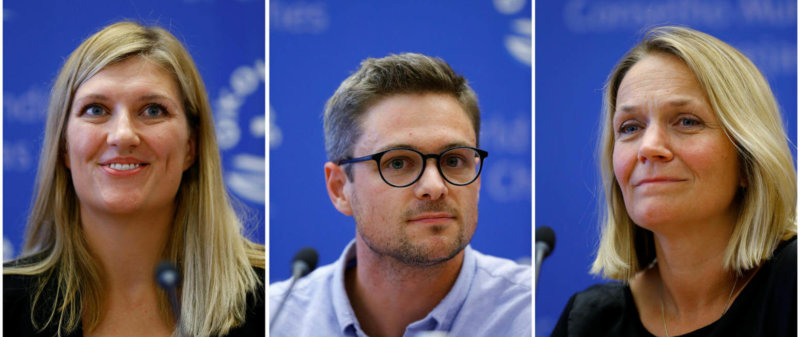VATICAN CITY —Emphasizing the hope for a nuclear-free world, the Nobel committee announced its decision to award the 2017 Nobel Peace Prize to the International Campaign to Abolish Nuclear Weapons.
The organization, also known by the acronym ICAN, was commended for its work in drawing attention “to the catastrophic humanitarian consequences of any use of nuclear weapons,” the committee said, announcing the prize Oct. 6.
“It is the firm conviction of the Norwegian Nobel committee that ICAN, more than anyone else, has in the past year given the efforts to achieve a world without nuclear weapons a new direction and new vigor,” it said.
Launched in 2007, the organization is a coalition of nongovernmental organizations in 101 countries aimed at promoting global nuclear disarmament.
The Nobel committee honored ICAN for its efforts to achieve a prohibition of nuclear weapons under international law through the U.N. Treaty on the Prohibition of Nuclear Weapons.
The treaty, which would enter into force 90 days after at least 50 countries both sign and ratify it, bans efforts to develop, produce, test, manufacture, acquire, possess or stockpile nuclear weapons or other nuclear explosive devices.
Although as of Sept. 20 the treaty had been signed by more than 40 countries, including the Holy See, the United States and other countries possessing nuclear weapons did not take part in the negotiations and do not plan to sign the treaty.
“We hope that with this year’s prize, we can support the great efforts ICAN has made to give new momentum and new vigor” to the goal of a nuclear-free world, the Nobel committee said.
“We live in a world where the risk of nuclear weapons being used is greater than it has been for a long time,” the committee said. “Some states are modernizing their nuclear arsenals, and there is a real danger that more countries will try to procure nuclear weapons, as exemplified by North Korea.”
The Vatican also has shared its concern regarding North Korea’s nuclear ambitions, and regarding the tensions North Korea’s actions have caused with the United States.
“The rising tensions over North Korea’s growing nuclear program are of special urgency,” Archbishop Paul Gallagher, Vatican foreign minister, said Sept. 20 at a U.N. conference on the Comprehensive Nuclear-Test-Ban Treaty.
“The threat or use of military force have no place in countering proliferation,” he said, “and the threat or use of nuclear weapons in countering nuclear proliferation are deplorable.”
In his speech to the United Nations Sept. 25, 2015, Pope Francis urged the international community to prohibit nuclear weapons, which provoke “fear and distrust” among nations and threaten “the destruction of all mankind.”
“There is urgent need to work for a world free of nuclear weapons, in full application of the nonproliferation treaty, in letter and spirit, with the goal of a complete prohibition of these weapons,” the pope said.


